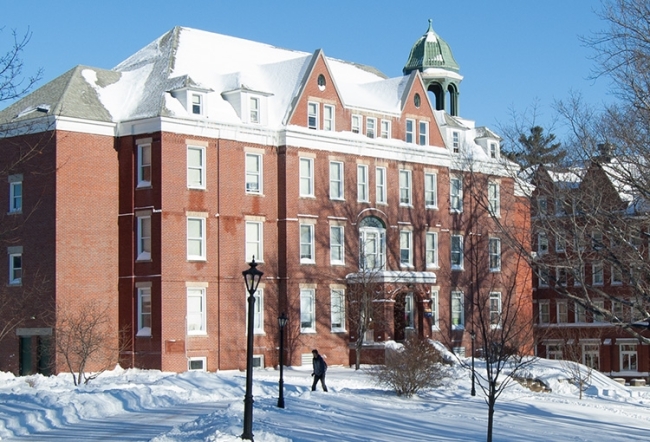You have /5 articles left.
Sign up for a free account or log in.

Faculty members are unhappy over an M.B.A. merger at the University of Southern Maine.
University of Southern Maine
An M.B.A. merger is making a mess in the University of Maine System.
Faculty members at the University of Southern Maine, in Portland, are upset at the progression of a plan that would have their institution’s M.B.A. program merged with the M.B.A. program of the flagship University of Maine in Orono. The merger is an early step in a plan to create a $150 million Maine Center for Graduate Professional Studies that would eventually be built in Portland to house various merged law, M.B.A., public service and management and human service programs.
But unhappy faculty members feel they haven’t been included in the process of shaping the merged M.B.A. program or the graduate center, which some see as an early step in an attempt to create a unified state university. They feel some of the recommendations they did make were not taken into account. And they believe administrators are pushing the restructuring through too quickly and before important details are in place -- placing their power over curriculum and governance in peril in order to satisfy outside influences pushing for the new graduate center.
Nerves are particularly frayed at Southern Maine, where faculty members view the University of Maine System of which they are a part with suspicion after a dispute over whether layoffs of 26 instructors in 2014 violated a faculty union contract went into arbitration that was settled largely in the university’s favor this year. There are fears that the M.B.A. merger amounts to closing Southern Maine’s program. Plans call for students of the merged program to earn University of Maine degrees even if they attend class on Southern Maine’s campus.
The local chapter of the faculty union is considering filing a grievance alleging that the university is violating its policies for closing programs. The university’s graduate council passed a motion urging Southern Maine’s administration to drop public support for the combination of the M.B.A. programs until governing structure and curriculum details are in place. To do otherwise, it said, would be misleading to current and prospective students.
Administrators maintain that they’re following procedures for establishing major university units and that they have engaged faculty members. They added that there is much work left to do on the merger and graduate center creation where faculty can be involved.
Tensions, however, have only grown in the last month as faculty members learned that the merged M.B.A. program is slated to start in the fall of 2017. The date was included last week as the university system published a business plan and announced its Board of Trustees would be voting over the weekend to endorse the graduate center concept along with a multistep implementation plan.
Trustees unanimously passed the resolution at a meeting Sunday. It specifically supports university system Chancellor James H. Page in efforts to find $15 million in grant support for an early phase of the plan. The development of a physical graduate center in Portland would follow at a later date.
“Maine’s universities are striving to be the state’s best and most responsive partner,” Page said in a statement after the measure passed. “The Maine Center plan is aspirational, exemplifying our One University commitment to move our state forward with innovative programing and stronger engagement with Maine’s business, legal and community leaders.”
Spokesman Dan Demeritt said that the implementation plan up for a vote was “very deliberate and inclusive.”
Faculty members don’t see it that way. Robert Heiser is an associate professor of marketing who directs Southern Maine’s M.B.A. program. The 2017 start date is a challenge, he said.
“At this point we have no governance, no curriculum, no processes, no admissions procedure,” Heiser said. “They have created chaos.”
Faculty members in the two business programs have been working toward agreements on issues like curriculum and governance for several years, Heiser said. There are some differences, such as the Southern Maine faculty fighting to keep specializations like data analytics and entrepreneurship. Southern Maine’s M.B.A. has more specialized programs than the flagship in Orono. It requires more credits -- 36 versus 30.
There are also bound to be tensions between the two programs, especially because Southern Maine’s M.B.A. is larger than the one on the flagship campus in Orono. Southern Maine’s program had 71 students in 2015-16. The University of Maine’s had 52. Southern Maine is in Portland, which has a population of roughly 66,000 people, while the flagship campus in Orono is located in a rural municipality with a population of fewer than 11,000.
Still, Heiser thinks that faculty members would be able to come into agreement if left to their own devices. He hasn’t seen that happen with the larger graduate center being formed. He described faculty groups as being rushed and largely excluded from the design and planning of the center.
“I can still understand why, for strategic reasons, you might want to merge them together,” Heiser said. “We’re businesspeople, two schools of business, after all. It’s the how. Not the what.”
The business plan for the Maine Center for Graduate Professional Studies places significant pressure on the M.B.A. merger. It says that the merged M.B.A. program has the largest untapped market potential of the programs it will include. It also says the Maine Center’s design rests in part on the idea that the M.B.A. program can grow by serving part-time and full-time students. The existing M.B.A. programs largely serve part-time students who have careers.
The plan calls for increasing M.B.A. enrollments to about 200. It also says the existing programs failed to adapt to competition from Husson University, Thomas College and Southern New Hampshire University. Southern Maine’s M.B.A. enrollment has dropped roughly by half in the last five years, it says.
“Neither of the UMS M.B.A. programs responded effectively to the disruption of a principal market (midcareer Maine students) with offerings designed to carve out a marketplace distinction and a competitive advantage,” the plan says. “Continuing to compete only in the very market where they were losing share in spite of being cost competitive, the UMS M.B.A. programs suffered steadily declining enrollment.”
There is much division in the University of Maine System over the genesis of the center. System Chancellor Page has said its creation is backed by business and legal leaders. The university system hired two-time independent gubernatorial candidate Eliot Cutler in 2015 to spearhead the center’s creation, and it’s backed by Maine’s Harold Alfond Foundation. The plan was to be forwarded to the foundation after trustees’ Sunday vote.
The foundation has provided $2.25 million for early-stage center development, the Portland Press Herald reported. But two-thirds of the capital needed to build the center has yet to be identified.
The Maine Center business plan spells out a governance structure in which program heads -- deans of law and business -- would report to provosts and presidents at the University of Southern Maine and the University of Maine. The M.B.A. program head would report to the University of Maine, with other heads reporting to Southern Maine.
Faculty members weren’t properly involved in the creation process, said Susan Feiner, a professor of economics and women's and gender studies who chairs the Southern Maine chapter of the Associated Faculties of the Universities of Maine. The governance issues affect faculty members at both institutions involved, she said.
“The unions and Faculty Senate have already expressed how frustrated we are with the lack of inclusion of faculty in this process,” she said. “The whole M.B.A. thing has exploded in importance around the timing issues being imposed.”
Feiner also questioned whether the planned center would actually be an improvement over what the university system has in place currently. She’s not convinced the university studied the idea properly.
Additionally, she worried the M.B.A. merger could be used as a model to circumvent rules around layoffs at Southern Maine. The university system can’t close Southern Maine programs in order to hire part-time faculty members who will do the same job as those who were laid off, she said. But she worries the new model could allow a new entity to hire part-time faculty members to do the work of Southern Maine faculty whose programs were closed for the merger.
That’s not why the university system is pursuing the changes, said spokesman Demeritt. Southern Maine President Glenn Cummings said there is an agreement in place that covers M.B.A. program hiring concerns and governance issues.
“The UMaine flagship has agreed to basically roll our faculty into the M.B.A. program,” Cummings said. “A council of faculty will decide on the governance of this new entity.”
Cummings also said that the combined program does not have to be fully operational in the fall of 2017. He termed the date a soft launch, under which a few courses will need to be taught under a joint curriculum.
More broadly, the issues at hand are a reflection of how difficult it can be to bring programs and universities together, Cummings said. He sees potential positives to a graduate center on his campus despite the difficulties -- it could provide important training, he said.
“There are so many agents inside and outside the university,” he said. “This is disruptive change at its best and at its worst.”








